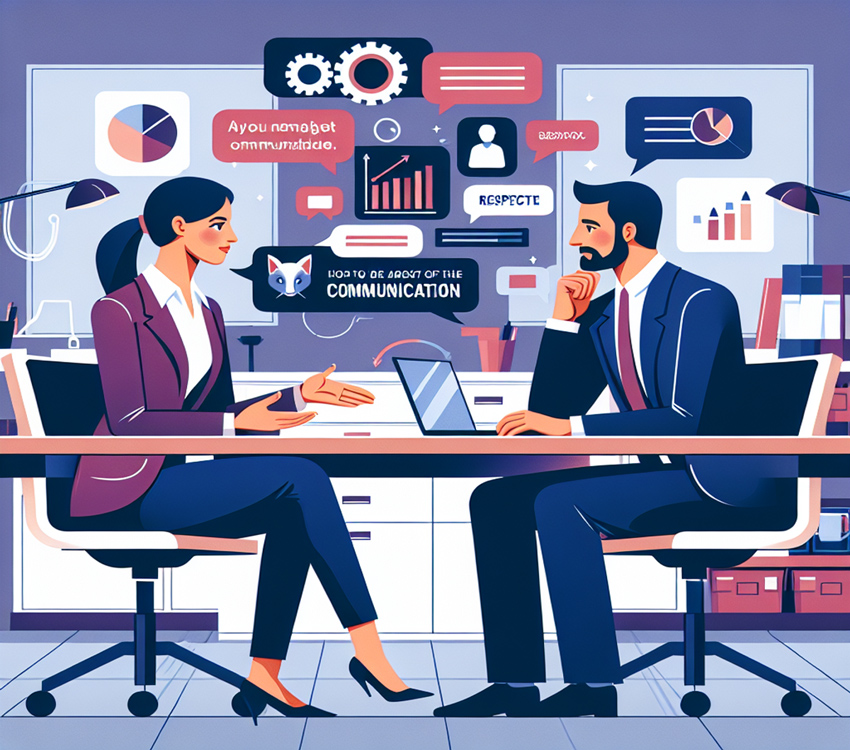Mastering Communication Manners, Digital Etiquette and all about professional communication strategies have been discussed in a fruitful way. Read carefully to get a clear picture of How to achieve Professional Communication Skills. Effective communication among colleagues is the linchpin of a thriving workplace and plays a pivotal role in organizational development. Universally accepted communication manners are not only a reflection of professionalism but also foster a positive work environment, enhance teamwork, and contribute to overall productivity. In this article, we will explore the best communication skills that can serve as a foundation for organizational growth. Effective communication manners create positive first impressions, establishing professionalism within the workplace. This professionalism is not only noticed by colleagues but also by clients, customers, and external stakeholders.Strong communication skills are essential for conflict resolution. Colleagues who can communicate openly and respectfully are better equipped to address and resolve conflicts, preventing them from escalating and affecting team dynamics. In this article you will learn the best professional communication skills which make you better in any work place. The corporate communication skills have been described here in this article.
Active Listening
Active listening is the bedrock of effective communication. Colleagues should make a conscious effort to truly understand what their counterparts are saying, demonstrating empathy and engagement. Avoid interrupting and instead focus on the speaker’s message. This promotes mutual respect and encourages a culture of open dialogue.
Clear and Concise Expression

Speak and Listen Carefully when a discuss with a colleague
Clarity in communication is essential for preventing misunderstandings. Colleagues should strive to express their thoughts in a clear and concise manner, avoiding jargon or overly complex language. Being articulate ensures that the intended message is accurately received, reducing the likelihood of miscommunication.Clear and respectful communication contributes to a positive work atmosphere. When colleagues feel valued and understood, morale is boosted, leading to increased job satisfaction and a more harmonious workplace.Clear and concise communication ensures that teams understand their roles and responsibilities, reducing the likelihood of misunderstandings. This, in turn, enhances teamwork and leads to more efficient project execution.
Constructive Feedback
Constructive feedback is a valuable tool for professional development. Colleagues should learn to provide feedback in a positive and constructive manner, emphasizing specific behaviors or outcomes rather than criticizing the individual. Similarly, they should be open to receiving feedback, viewing it as an opportunity for personal and professional growth.
Respect for Diverse Perspectives
In a diverse workplace, colleagues must respect and appreciate different perspectives and communication styles. Cultivating an inclusive environment fosters innovation and creativity. Embracing diversity in communication enhances collaboration and contributes to a more dynamic and adaptable organization.
Timely and Transparent Communication
Timeliness is crucial in organizational settings. Colleagues should communicate important information promptly, ensuring that everyone is on the same page. Transparency builds trust among team members and helps in fostering a culture of accountability and responsibility.
Digital Etiquette

Why Digital Etiquette is important in corporate culture?
As digital communication becomes increasingly prevalent, mastering digital etiquette is essential. Colleagues should be mindful of their tone in emails, messages, and other virtual platforms. Clear subject lines, proper grammar, and polite language contribute to a professional and respectful digital communication environment.
Conflict Resolution Skills
Conflicts are inevitable in any workplace, but how they are handled can significantly impact organizational development. Colleagues should develop effective conflict resolution skills, focusing on finding common ground and maintaining a positive working relationship. Open communication channels and a willingness to compromise are key components of conflict resolution.
Team Collaboration
Successful organizations thrive on collaboration. Colleagues should actively seek opportunities to collaborate with team members, fostering a sense of unity and shared purpose. Effective communication within teams ensures that tasks are efficiently executed and collective goals are achieved.
Adaptability in Communication
Organizations are dynamic entities that undergo constant change. Colleagues with strong communication manners should be adaptable to varying communication needs. Whether it’s adjusting communication styles for different team members or embracing new technologies, adaptability ensures that the flow of information remains smooth, even in the face of organizational shifts.
Celebrating Achievements
Positive communication isn’t just about addressing challenges; it’s also about acknowledging and celebrating successes. Colleagues should make a habit of recognizing and appreciating each other’s achievements. This not only boosts morale but also creates a positive atmosphere where individuals feel valued and motivated to contribute their best to the organization.
Cultural Sensitivity

Listen first and then speak with respect
In a globalized workforce, cultural sensitivity is paramount. Colleagues should be aware of and respectful towards cultural differences in communication norms. Understanding cultural nuances prevents unintentional misunderstandings and promotes a harmonious work environment.
Professional Boundaries
Maintaining professional boundaries is crucial for a healthy workplace. Colleagues should be mindful of the appropriateness of their communication, avoiding gossip or discussing sensitive personal matters in a professional setting. This fosters a culture of professionalism and ensures that the focus remains on work-related goals.
Encouraging Open Door Policies
Leaders within the organization should encourage an open-door policy, signaling that they are approachable and receptive to discussions. This facilitates a culture where employees feel comfortable sharing ideas, concerns, and feedback, fostering a sense of trust and openness throughout the organization.
Training and Development Opportunities
Investing in communication skills training and development programs is a proactive approach to enhancing organizational communication. Providing employees with the tools and knowledge to improve their communication abilities not only benefits individual growth but also contributes to the overall development of the organization.
Regular Communication Assessments
Organizations should periodically assess the effectiveness of their communication channels and strategies. This can be done through surveys, feedback sessions, or regular check-ins. Identifying areas of improvement allows the organization to adapt and evolve its communication practices to meet the changing needs of its workforce.
Why Communication Manners, The Cornerstone of Organizational Development is very important for any profession?
Communication Manners: The Cornerstone of Organizational Development” is exceptionally important for any profession due to several compelling reasons that extend beyond mere etiquette. Here’s a breakdown of why this aspect holds paramount significance.
Boosting Productivity-Clarity in Instructions
Proper communication ensures that instructions and expectations are communicated clearly. This clarity minimizes the chances of errors or misunderstandings, leading to increased productivity.
Customer Satisfaction-External Communication
In professions involving customer interaction, communication manners directly impact customer satisfaction. Polite and effective communication builds trust and loyalty, crucial for client retention and business success.
Career Advancement-Professional Image

The Best Communication Skill for Professional and corporate culture
Individuals with strong communication manners are often viewed as more competent and reliable. This positive professional image can contribute to career advancement opportunities and increased responsibilities.
Adaptability to Change-Smooth Transition
In rapidly evolving professional landscapes, effective communication helps organizations adapt to change more smoothly. Colleagues who can communicate openly and positively during transitions contribute to a resilient and adaptable workplace.
Global Connectivity-Cultural Competence
As workplaces become more diverse and globally connected, understanding and respecting diverse communication styles is crucial. Communication manners that account for cultural differences foster a global mindset within the organization.
Leadership Effectiveness-Inspiring Teams
Effective leaders understand the importance of communication manners. Leaders who communicate with clarity, empathy, and transparency inspire trust and motivate their teams to achieve collective goals.

Best way of talking with colleagues
Innovation and Creativity-Open Dialogue
A workplace that encourages open communication fosters an environment conducive to innovation and creativity. Colleagues feel comfortable sharing ideas, leading to collaborative problem-solving and continuous improvement.
Risk Mitigation-Avoiding Miscommunication
Clear and precise communication reduces the risk of misunderstandings that could lead to costly errors or project delays. This risk mitigation is especially critical in professions where accuracy is paramount.
In brief, effective communication manners are foundational for any profession because they contribute to a positive work environment, enhance collaboration, reduce conflicts, and ultimately drive organizational success. They are not just social niceties but essential skills that permeate every aspect of professional life, impacting individual careers and the overall health of an organization.
Conclusion of Communication Manners
In conclusion, mastering communication manners is not just about polite interactions; it is a fundamental aspect of organizational development. Colleagues who actively engage in effective communication contribute to a positive work culture, enhanced teamwork, and increased productivity. By incorporating these universally accepted communication skills into daily interactions, organizations can build a solid foundation for sustained growth and success. The Art Of Communication is very important to get best career in any profession.Also effective communication manners are not a static set of skills but a dynamic and evolving aspect of organizational development. Colleagues who consistently practice these communication skills contribute to a workplace culture that values collaboration, understanding, and growth. By prioritizing these universally accepted communication skills, organizations can create a resilient and adaptable environment that propels them towards sustained success.


